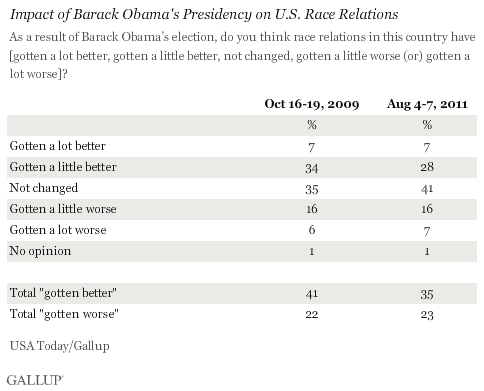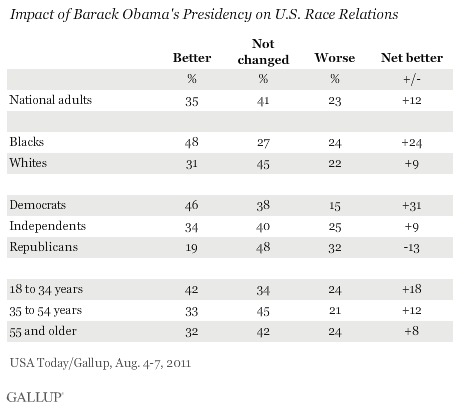PRINCETON, NJ -- By 35% to 23%, more Americans believe U.S. race relations have gotten better rather than worse with Barack Obama's election as president. However, this positive tilt is not as strong as what Gallup found in October 2009, when 41% said relations had improved and 22% said they had gotten worse. Currently, the plurality of Americans, 41%, say race relations have not changed as a result of Obama's presidency.

These findings are based on an Aug. 4-7 USA Today/Gallup poll, conducted in advance of the Aug. 28 dedication of a national memorial to Martin Luther King Jr. in Washington, D.C. That date coincides with the 48th anniversary of King's "I Have a Dream" speech in which the civil rights leader made his most momentous appeal for racial harmony and equality. The poll included an oversample of black Americans.
2008 Predictions Were Far Rosier Than Current Perceptions
Just a day after Obama's election as the nation's first black president in November 2008, Gallup found the vast majority of Americans, 70%, predicting that race relations would get better as a result of his presidency. Prior to his election, in June-July 2008, 56% of Americans said race relations would get better if Obama were elected. This included 65% of blacks and 54% of whites. Currently, 48% of blacks and 31% of whites say race relations have gotten better under Obama.
Gallup finds even wider differences by party ID, with 46% of Democrats perceiving improvement in race relations, compared with 19% of Republicans. Young adults are a bit more upbeat than those 55 and older about the recent progress made on race relations.

Despite the decline since 2008 and 2009 in the percentage who view Obama's election as having improved race relations, Americans as a whole are still optimistic that race relations will get better in the years ahead as a result of Obama's presidency. Fifty-two percent hold this view, while 35% predict no change and 11% say race relations will get worse.
Americans Less Likely to See Obama's Election as Milestone for Blacks
The poll also finds a decline in perceptions of Obama's election as one of the most important advances for U.S. blacks in the last 100 years: 42% say this today, fewer than the 58% who said so in 2009, and the 71% right after his election.
The decline is evident largely among whites, dropping nearly 20 percentage points from 56% in 2009 to 37% today, compared with a 6-point decline among blacks, 71% to 65%.
Bottom Line
On balance, Americans, and particularly blacks and Democrats, are more likely to believe the election of the nation's first black president has resulted in improved race relations rather than poorer relations. However, the current 12-point national edge for optimists on this score is not as upbeat as Gallup found in Obama's first year as president, and is a long way from the widespread optimism Americans expressed immediately after his election.
Survey Methods
Results for this USA Today/Gallup poll are based on telephone interviews conducted Aug. 4-7, 2011, with a random sample of 1,319 adults, aged 18 and older, living in the continental U.S., selected using random-digit-dial sampling. This includes an oversample of 376 non-Hispanic blacks, consisting of 88 interviews done as part of the random national sample and 288 interviews with blacks who had previously participated in national Gallup polls and agreed to be re-interviewed at a later date. The data from the national sample and re-interviews are combined and weighted to be demographically representative of the national adult population in the United States and to reflect the proper proportion of blacks in the overall population
For results based on the total sample of national adults, one can say with 95% confidence that the maximum margin of sampling error is ±4 percentage points.
For results based on the sample of 376 non-Hispanic blacks, the maximum margin of sampling error is ±6 percentage points.
For results based on the sample of 796 non-Hispanic whites, the maximum margin of sample error is ±5 percentage points.
Interviews are conducted with respondents on landline telephones and cellular phones, with interviews conducted in Spanish for respondents who are primarily Spanish-speaking. Each sample includes a minimum quota of 400 cell phone respondents and 600 landline respondents per 1,000 national adults, with additional minimum quotas among landline respondents by region. Landline telephone numbers are chosen at random among listed telephone numbers. Cell phone numbers are selected using random-digit-dial methods. Landline respondents are chosen at random within each household on the basis of which member had the most recent birthday.
Samples are weighted by gender, age, race, Hispanic ethnicity, education, region, adults in the household, and phone status (cell phone only/landline only/both, cell phone mostly, and having an unlisted landline number). Demographic weighting targets are based on the March 2010 Current Population Survey figures for the aged 18 and older non-institutionalized population living in U.S. telephone households. All reported margins of sampling error include the computed design effects for weighting and sample design.
In addition to sampling error, question wording and practical difficulties in conducting surveys can introduce error or bias into the findings of public opinion polls.
View methodology, full question results, and trend data.For more details on Gallup's polling methodology, visit www.gallup.com.
